 Petzlover
Petzlover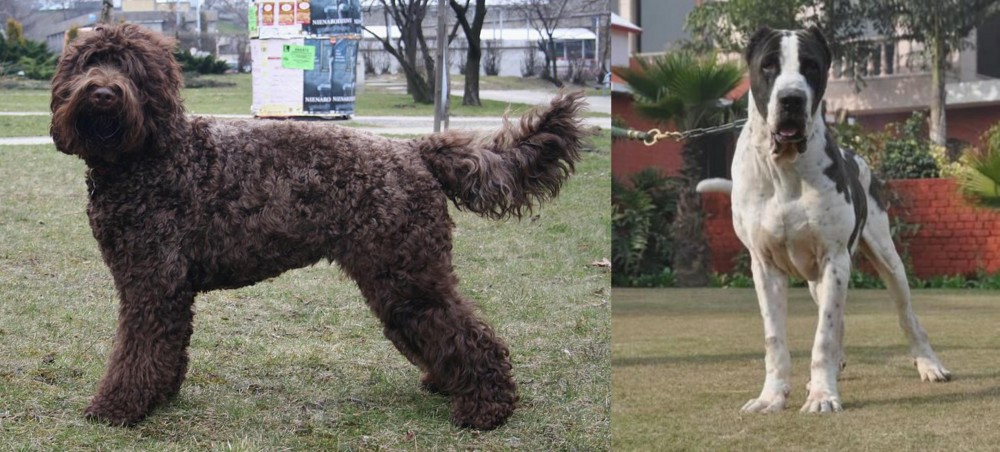 Barbet is originated from France but Bully Kutta is originated from India. Barbet may grow 23 cm / 9 inches shorter than Bully Kutta. Barbet may weigh 62 kg / 136 pounds lesser than Bully Kutta. Barbet may live 3 years more than Bully Kutta. Barbet may have less litter size than Bully Kutta. Barbet requires Moderate Maintenance. But Bully Kutta requires Low Maintenance
Barbet is originated from France but Bully Kutta is originated from India. Barbet may grow 23 cm / 9 inches shorter than Bully Kutta. Barbet may weigh 62 kg / 136 pounds lesser than Bully Kutta. Barbet may live 3 years more than Bully Kutta. Barbet may have less litter size than Bully Kutta. Barbet requires Moderate Maintenance. But Bully Kutta requires Low Maintenance
 The Barbet is an ancient European waterdog, with the first references to it coming way back from 1387. This breed is thought to serve as a common ancestor for several other waterdogs, and these include the poodle. The breed was used to retrieve water fowl from water, and today it is used as a gundog and as a companion.
The Barbet is an ancient European waterdog, with the first references to it coming way back from 1387. This breed is thought to serve as a common ancestor for several other waterdogs, and these include the poodle. The breed was used to retrieve water fowl from water, and today it is used as a gundog and as a companion.
The name ‘Barbet’ comes from the French word for beard, which is ‘barbe’. The Kennel Club has announced that this dog is to be described as being in a class of its own, and it has become the 220th pedigree breed.
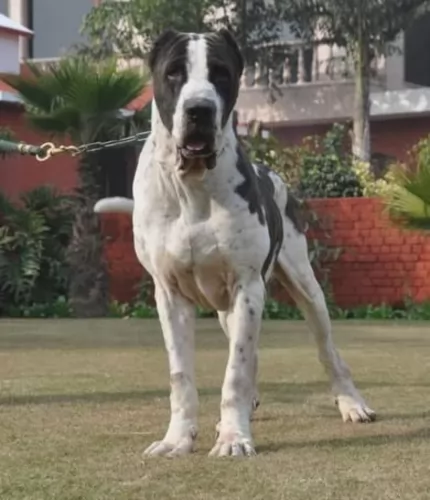 This well built, powerful dog breed is also known as Indian Alangu Mastiff or Pakistani Mastiff. These dogs come from the Punjab and Sindh region of the Indian subcontinent. It is believed that mastiff dogs came with British soldiers during the British invasion, however English Mastiffs, Bulldogs, Bull Terriers and Great Danes are seen as potential ancestors of this large dog.
This well built, powerful dog breed is also known as Indian Alangu Mastiff or Pakistani Mastiff. These dogs come from the Punjab and Sindh region of the Indian subcontinent. It is believed that mastiff dogs came with British soldiers during the British invasion, however English Mastiffs, Bulldogs, Bull Terriers and Great Danes are seen as potential ancestors of this large dog.
There are disputes about the country of origin of this breed, and some people claim that the dog comes from India, while others say it comes from Pakistan. Certainly in Pakistan these dogs are still used for fighting.
 The Barbet is a medium-sized breed of French water dog, measuring anything between 52–66cm in height. The dog is known for his thick, curly textured coat and even the head and tail are covered with this dense hair. His coat is waterproof.
The Barbet is a medium-sized breed of French water dog, measuring anything between 52–66cm in height. The dog is known for his thick, curly textured coat and even the head and tail are covered with this dense hair. His coat is waterproof.
The coat can vary in color and these colors can be brown, grey, white, fawn or black. The dog isn’t a heavy shedder. The Barbet’s tail is long and somewhat raised but not erect. He has long, wide pendant ears set at eye height, the skull is broad and the neck short and strong.
With his kind brown eyes, it simply adds to the kindly expression of this attractive gun dog. He is a friendly, fun-loving dog, and makes a great family pet. He loves to swim and in fact has webbed paws to assist him with his swimming. Some dog owners say that this intelligent active breed can be a great watchdog, while others say the being a guard dog isn’t a particularly strong characteristic.
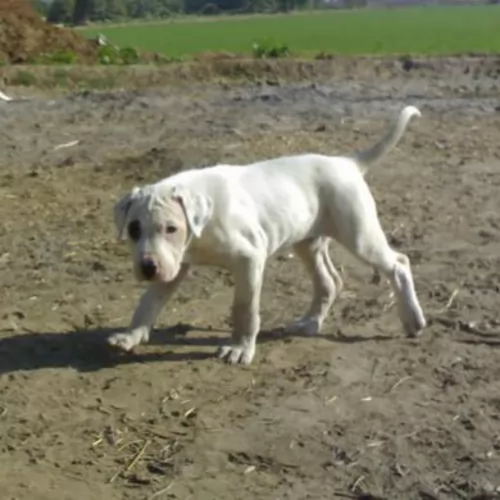 The Bully Kutta is a big, heavy, muscular dog, standing at roughly 81 – 89cm and weighing in at 70–90kg. He isn’t particularly good with children or with other pets simply because the dog is aggressive by nature. If you do opt for this large breed, you’re going to need a large garden and he is going to require a lot of exercise.
The Bully Kutta is a big, heavy, muscular dog, standing at roughly 81 – 89cm and weighing in at 70–90kg. He isn’t particularly good with children or with other pets simply because the dog is aggressive by nature. If you do opt for this large breed, you’re going to need a large garden and he is going to require a lot of exercise.
This is a dog breed that is going to require socialization and training if you want him to be obedient and calm, as he is inclined to be a dominating breed. He’s an intelligent dog and when well trained, he makes a splendid pet with firm, fair owners.
The Bully Kutta has a large, broad head which is supported by a thick well-muscled neck. The skin around his lower jaw is loose. The ears are short, set high and are mostly cropped, but other times they are left to flop over. The tail is sometimes docked but these days mostly left long and tapered.
He has a short smooth coat and is essentially white in color although the coat can also be fawn, brown, black or brindle.
 Most Barbets do superbly well with children and are naturally gentle with them. It is always important to teach children to respect animals and to be kind towards them. Even a gentle dog like the Barbet can turn aggressive if taunted beyond their endurance.
Most Barbets do superbly well with children and are naturally gentle with them. It is always important to teach children to respect animals and to be kind towards them. Even a gentle dog like the Barbet can turn aggressive if taunted beyond their endurance.
Barbets are social, good mixers and they get on well with other pets in the family, more so when they have been properly socialized. As a Sporting breed, the Barbet is energetic and loves to be involved in games and activities. He is such a versatile dog – gentle and friendly and he makes a wonderful devoted pet. Of course, he is also suited for use as a working dog, after all this breed was originally used for hunting waterfowl.
Treat him well and the thanks you’ll get will is unconditional friendship and loyalty.
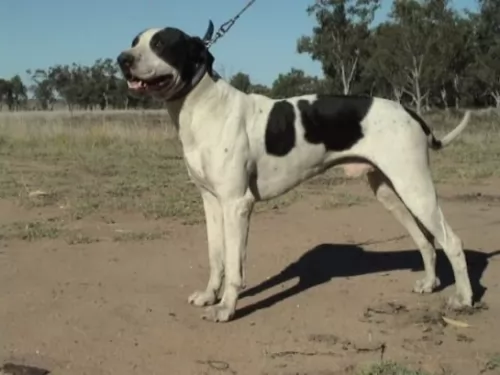 The Bully Kutta is a powerful, imposing dog and they have been nicknamed the ‘Beast from the East’. Unfortunately it is this dog’s thick bones, his looks and his strength that have him used for cruel dog fighting in Pakistan.
The Bully Kutta is a powerful, imposing dog and they have been nicknamed the ‘Beast from the East’. Unfortunately it is this dog’s thick bones, his looks and his strength that have him used for cruel dog fighting in Pakistan.
When not used for fighting, he makes a loyal, devoted companion for the owner who ensures proper socialization and training. Well raised Bully Kuttas are then good with children, being loving, protective and playful.
One just hopes that the future of this giant dog breed is brighter, and that he will be looked upon as more of a companion that just a dog-fighting object to bring in money for his owner.
 The Barbet is a rare breed and therefore not much is known about particular health issues affecting him. Some health issues that you will need to be alert about with your Barbet are ear infections, hernias and hip dysplasia.
The Barbet is a rare breed and therefore not much is known about particular health issues affecting him. Some health issues that you will need to be alert about with your Barbet are ear infections, hernias and hip dysplasia.
A veterinarian should be consulted if your dog shows signs of these ailments. The risk of a Barbet developing any health condition can always be significantly reduced by making sure you buy your Barbet from a reputable breeder. If he is fed well and taken to the vet when he does get sick, he can live to be 13 to 15 years of age.
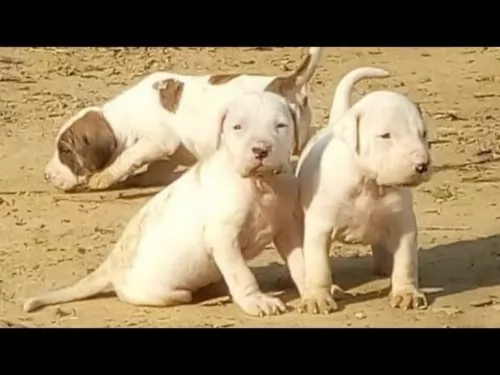 Your Bully Kutta is generally a healthy dog and not often affected by hereditary diseases, but with giant breeds such as this you will have to look out for diseases common to large dogs.
Your Bully Kutta is generally a healthy dog and not often affected by hereditary diseases, but with giant breeds such as this you will have to look out for diseases common to large dogs.
Typical illnesses to watch out for will include hip dysplasia, arthritis, skin allergies and bloat.
This is an inherited condition where the hip joint is improperly formed. For your Bully Kutta it causes wear and tear as well as stiffness in the hips and your dog battles to rise after lying down.
Arthritis in your dog can be managed but it can cause a lot of discomfort for him. This inflammation of the joints can cause pain and stiffness. It is more often seen in older dogs. It can also start at an early age because of problems with bone and joint development and abnormal rubbing within the joint.
Today there are a number of therapy options that can bring some kind of relief to your dog.
 The Barbet’s coat is longish and curly, much like a poodle, and long, wooly coat This being the case, moderate maintenance is required. Brushing and grooming twice a week will be necessary to keep the coat from matting too much. In fact, some Barbet owners prefer to keep their Barbets professionally groomed so that the thick hair is fairly short all over.
The Barbet’s coat is longish and curly, much like a poodle, and long, wooly coat This being the case, moderate maintenance is required. Brushing and grooming twice a week will be necessary to keep the coat from matting too much. In fact, some Barbet owners prefer to keep their Barbets professionally groomed so that the thick hair is fairly short all over.
The dog’s ears will also need to be kept clean and dry.
If your Barbet is a farm dog, used for hunting or working purposes, make sure to buy dog food formulated for active dogs. Your Barbet puppy up to the age of 3 months will require 4 meals a day. When your Barbet reaches a year of age he can be fed one or two bowls of food. Speak to your veterinarian about top-quality wet- and dry foods. Every dog will require raw meat added into their food once in a while.
Make sure there is a constant supply of cool, fresh water and also wash his food and water bowls regularly.
The Barbet is an intelligent breed and therefore trainable. Dog owners who care for their pets, see to it that they are trained and have been socialized. This makes dogs much nicer to live with as they get on well with children and other pets and they don’t bark incessantly.
The Barbet is a working breed so you can’t just leave him in your back garden day after day. To stay healthy and happy, he will need to be played with, taken for walks and exercised regularly.
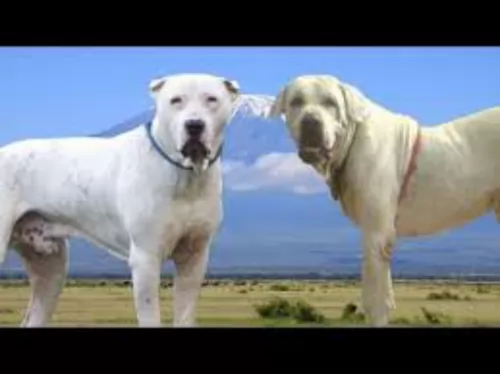 The short coat is low maintenance and as a moderate shedder too, all that is required really is to give your Bully Kutta a good brush twice a week to keep the coat in good condition.
The short coat is low maintenance and as a moderate shedder too, all that is required really is to give your Bully Kutta a good brush twice a week to keep the coat in good condition.
Brush his teeth 2 or 3 times a week with special canine-toothpaste and toothbrush to prevent plaque build-up. He’s a drooler too, so you will need to wipe his face and maybe your clothes of slobber from time to time.
This strong, muscular dog of yours will require an excellent diet. It’s always wonderful if you can give him home-made food such as vegetables, rice and meat. These days you get excellent commercially manufactured food for dogs, and your vet can advise you on the best food for a large, active dog such as the Buly Kutta.
Raw meat is absolutely essential for your dog from time to time and will ensure that his coat doesn’t become dull and with bald spots. Remember, that before dogs were domesticated they used to live on raw meat, so see that he gets some raw meat to prevent skin disorders. Make sure your large pet has a constant supply of fresh, cool water.
Bully Kuttas are going to need a walk every day in the form of exercise. If he is socialized you can take him into the park for ball games. He is a dog that will require plenty of space.